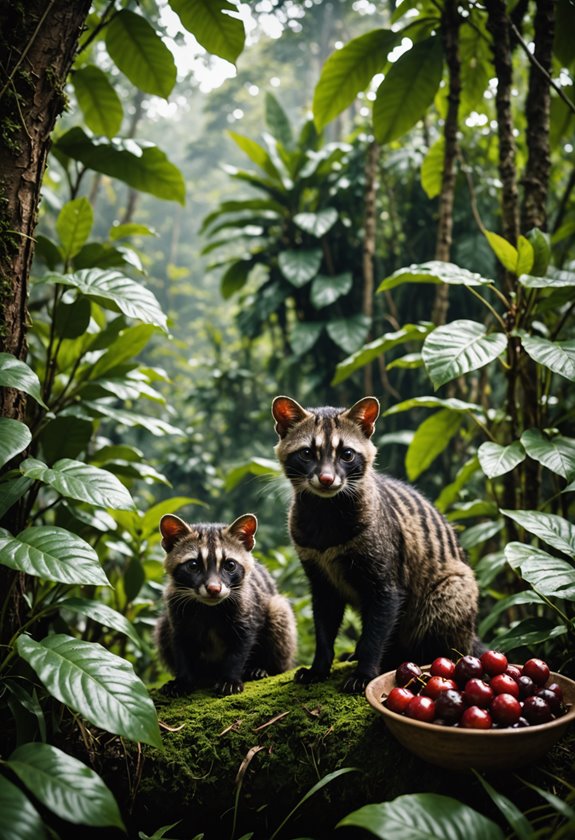What Is the Animal That Poops Out Coffee Beans?
You're curious about the Asian palm civet, an intriguing nocturnal animal from Southeast Asia that plays a unique role in producing Kopi Luwak, the world's rarest coffee. The civet eats the ripest coffee cherries, and during digestion, enzymes alter the beans, enhancing their flavor. After excretion, these beans are cleaned and roasted, creating a luxurious brew. However, ethical concerns arise from caged civets facing poor conditions, which affect both their well-being and the coffee's quality. So, if you're intrigued by this fascinating process and its intricacies, there's much more to uncover about the civet, its diet, and ethical sourcing.
Key Takeaways
- The Asian Palm Civet, scientifically named Paradoxurus hermaphroditus, is the animal that poops out coffee beans.
- Civets consume ripe coffee cherries, and their digestion ferments the beans, altering the flavor for Kopi Luwak coffee.
- Civet coffee, also known as Kopi Luwak, is rare and expensive, with annual production around 50 tons.
- Ethical concerns arise from caged civets facing stress and malnutrition, affecting coffee quality and animal welfare.
- Consumers should seek certified brands to ensure ethical sourcing and prioritize animal welfare in civet coffee production.
Asian Palm Civet Characteristics

The Asian palm civet, or Paradoxurus hermaphroditus, is a fascinating creature with a unique set of characteristics. Found primarily in Southeast Asia, this nocturnal animal is known for its solitary behavior, preferring to roam alone during the night.
Its stocky body, covered in coarse, shaggy greyish hair, features a distinctive white mask across its forehead, making it easily recognizable. Weighing between 2 to 5 kg, this civet can emit a strong-smelling secretion from its anal scent glands as a defense mechanism.
Diet and Seed Dispersal****
As an omnivore, the Asian palm civet's diet is varied, consisting mainly of fruits such as berries and mangoes, which are abundant in its tropical habitat.
This fruit-based diet plays an essential role in seed dispersal, as the civet consumes and later excretes seeds, aiding in the growth of new plants. Additionally, they sometimes eat small mammals and insects, showcasing their adaptability and resourcefulness.
Interaction with Coffee Beans****
Interestingly, these civets are also known for their interaction with coffee beans. They consume the ripe beans as part of their diet, which leads to a unique process that we'll investigate later.
Understanding their characteristics provides understanding into their ecological importance.
Kopi Luwak Production Process
Although many might find it surprising, the production of Kopi Luwak, or civet coffee, starts with the Asian palm civet's unique dietary habits. These small creatures are picky eaters, choosing only the ripest coffee cherries.
As the civet consumes these cherries, the coffee beans undergo a fascinating alteration. During digestion, enzymes ferment the beans, changing their flavor profiles. This natural fermentation enhances the beans, creating the unique taste that makes Kopi Luwak so sought after.
Once excreted, collecting the coffee beans becomes a labor-intensive task. Workers must thoroughly clean the beans, a process that requires patience and care, before they can be roasted and brewed.
The civet's diet greatly impacts the coffee's quality, with wild-foraging civets providing the best beans.
Let's investigate some key points about the Kopi Luwak production process:
- Selective eating: Civets choose only the best cherries.
- Natural fermentation: Enzymes enhance flavor during digestion.
- Labor-intensive collection: Gathering beans from civet feces.
- Flavor profiles: Vary based on civet diet and cherry type.
- Expensive coffee: Prices range from $100 to $600 per pound.
With only about 50 tons produced annually, Kopi Luwak is one of the rarest, most expensive coffees globally.
Ethical Concerns in Civet Coffee

While enjoying a cup of Kopi Luwak, it's vital to comprehend the ethical concerns surrounding its production. Many civets, small nocturnal mammals, are kept in cages and force-fed coffee cherries to produce these unique coffee beans. This practice often results in significant stress, illness, and malnutrition for the animals, raising serious animal welfare issues.
The stress and poor health of the caged civets not only harm the animals but also compromise the quality of the coffee beans.
Ethical sourcing of Kopi Luwak is a growing concern. With the demand for wild-sourced coffee rising, there's a push to find more humane ways to produce this specialty drink. However, wild-sourced practices can also threaten civet populations in their natural habitats.
As consumers, understanding these intricacies is vital when choosing to indulge in this pricey beverage.
Fraudulent practices further complicate the market, with some sellers labeling regular coffee beans as genuine civet coffee. This deception makes it challenging to guarantee ethical sourcing.
To make informed decisions, look for certifications or trusted sources that prioritize animal welfare and transparent production practices.
Let's investigate these issues to make more ethical choices in the specialty coffee market.
Frequently Asked Questions
What Animal Pooped Out Coffee Bean?
You might find it surprising, but the animal you're thinking of is the Asian palm civet. They consume ripe coffee cherries, and after digestion, excrete the beans. This unique process creates the renowned Kopi Luwak coffee.
Why Is Kopi Luwak so Expensive?
You're paying for a unique process where civets digest coffee cherries, improving flavor. It's costly because of laborious collection from feces, limited production, and increasing demand. Ethical sourcing challenges also elevate prices, appealing to conscious consumers.
How Much Is 1 Cup of Kopi Luwak?
You're looking at $35 to $80 for a cup of Kopi Luwak. The price reflects its rarity and unique production process. Always check the source and quality, as authentic wild civet-sourced beans are pricier.
What Is Kopi Luwak Made Out Of?
Kopi Luwak's made from coffee beans that've been eaten and excreted by the Asian palm civet. The beans undergo fermentation in the civet's digestive tract, resulting in a smoother flavor with lower acidity than regular coffee.







